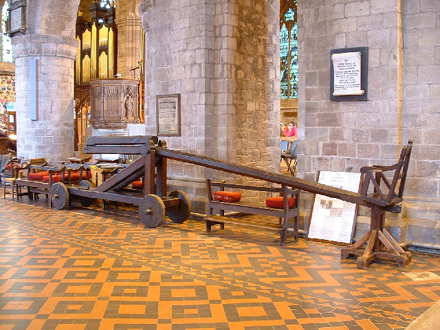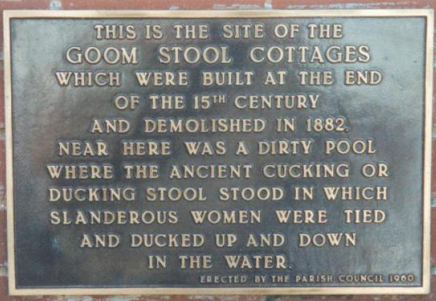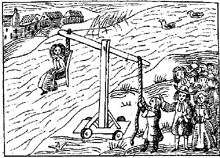|
In medieval times if you were accused of being a common scold you were probably an unruly quean, a troublesome strumpet or a scolding harridan. At worst you were probably an habitual nuisance to your neighbours and at least a nagging, quarrelsome wife. For your punishment you would be partially stripped and strapped to a goomstool at the place of your crime for public humiliation. Exposed there, similar to the medieval stocks, you would be subjected to ridicule by your fellow locals, mocked and pelted with rubbish.

Leominster's Cucking Stool [Copyright John Phillips]
This Saxon punishment evolved into the 'engine of correction' called the cucking stool, which allowed the common scold to be raised off the ground and wheeled about the place for show or repeatedly dunked into freezing or filthy water in the local duck pond. This was a popular punishment in the Sixteenth and Seventeenth centuries. It has now been 200 years since the last woman in England was so dunked - the 'notorious scold' - Jenny Pipes from Leominster in 1809.
[NB The Common Scold, communis rixatrix, was a common law that applied only to women.]
Then was the Scold herself,
In a wheelbarrow brought,
Stripped naked to the smock,
As in that case she ought:
Neats tongues about her neck
Were hung in open show;
And thus unto the cucking stool
This famous scold did go.
["The Cucking of a Scold" - a ballad, dating from about 1615]
The word cucking derives from the Saxon cukken - to defecate, and survives in our present English in the form of cack (vulgar) and in the nursery word kaka. In Yiddish it is kucker; in Latin cacare. The offending scold would quite literally be strapped and sitting on a 'cacking' stool in full public view.
"The cucking-stool was a seat of a kind which delicacy forbids us particularly to describe, used for the exposure of flagitious females at their own doors or in some other public place, as a means of putting upon them the last degree of ignominy."
[Chambers Book of Days]
"The Domesday Book notes the use of a cucking stool at Chester, a seat also known as cathedra stercoris, a "dung chair", whose punishment apparently involved exposing the sitter's buttocks to onlookers."
[Wikipedia]
Historical records reveal that there were regional differences in the construction of the cucking stool and the manner of the punishment. Variations of the punishment would also have reflected the nature and seriousness of the crime.
Locally a 'gummy' was a gossip or a scold. In Tetbury in the Cotswolds there was a Gumstool Hill and there still is the Gumstool Inn. Closer to home this translates as goomstool. At Lea near Ross-on-Wye there is both a Goomstool Barn and a Goomstool Cottage. In Upton-upon-Severn there were the locally famous Goom Stool Cottages, now remembered by a plaque which describes the medieval punishment once practised there.

[This goomstool variance appears to highly localised as I can find no other reference to it apart from these in Herefordshire.]
 The name we now commonly associate with this punishment is ducking stool, a term which conveniently hides its not so innocent past. Most people will associate ducking stools with discovering and punishing medieval witches - if she drowns she was innocent, if she survived she was a witch: 'Burn her! Burn her!' However, the primary purpose of the cucking stool as a punishment was for men to socially control women by fear of their worst humiliation: The name we now commonly associate with this punishment is ducking stool, a term which conveniently hides its not so innocent past. Most people will associate ducking stools with discovering and punishing medieval witches - if she drowns she was innocent, if she survived she was a witch: 'Burn her! Burn her!' However, the primary purpose of the cucking stool as a punishment was for men to socially control women by fear of their worst humiliation:
"I'll speed me to the pond, where the high stool
On the long plank, hangs o'er the muddy pool,
That stool the dread of ev'ry scolding quean."
[A pastoral poem by John Gay 1685–1732]
In this medieval society the cucking stool punishment was well attended by the public:
"Last week a woman that keeps the Queen's Head ale-house at Kingston, in Surrey, was ordered by the court to be ducked for scolding, and was accordingly placed in the chair, and ducked in the river Thames, under Kingston bridge, in the presence of 2,000 or 3,000 people."
[London Evening Post of April 27th, 1745]
Seemingly this lewd exhibition was also well enjoyed, at least by the men-folk:
"When at length the hour of retribution arrived, we can imagine the people to have been in a state of no small excitement. Labour would be deserted. All the world would be out of doors. The administrators would appear in young eyes to have something of a heroic bearing. Men would shout; women would look timidly from doors; dogs would yelp."
[Chambers Book of Days]
In 1967 the Common Scold law was finally removed from the statute books. The last attempt to use it was in 1817 when Sarah Leeke was sentenced to a dunking in the local pond. The water though was too low for this purpose so she was 'merely' wheeled around the town in the chair.
Where did Sarah Leeke hail from? Well, Leominster, of course.
|